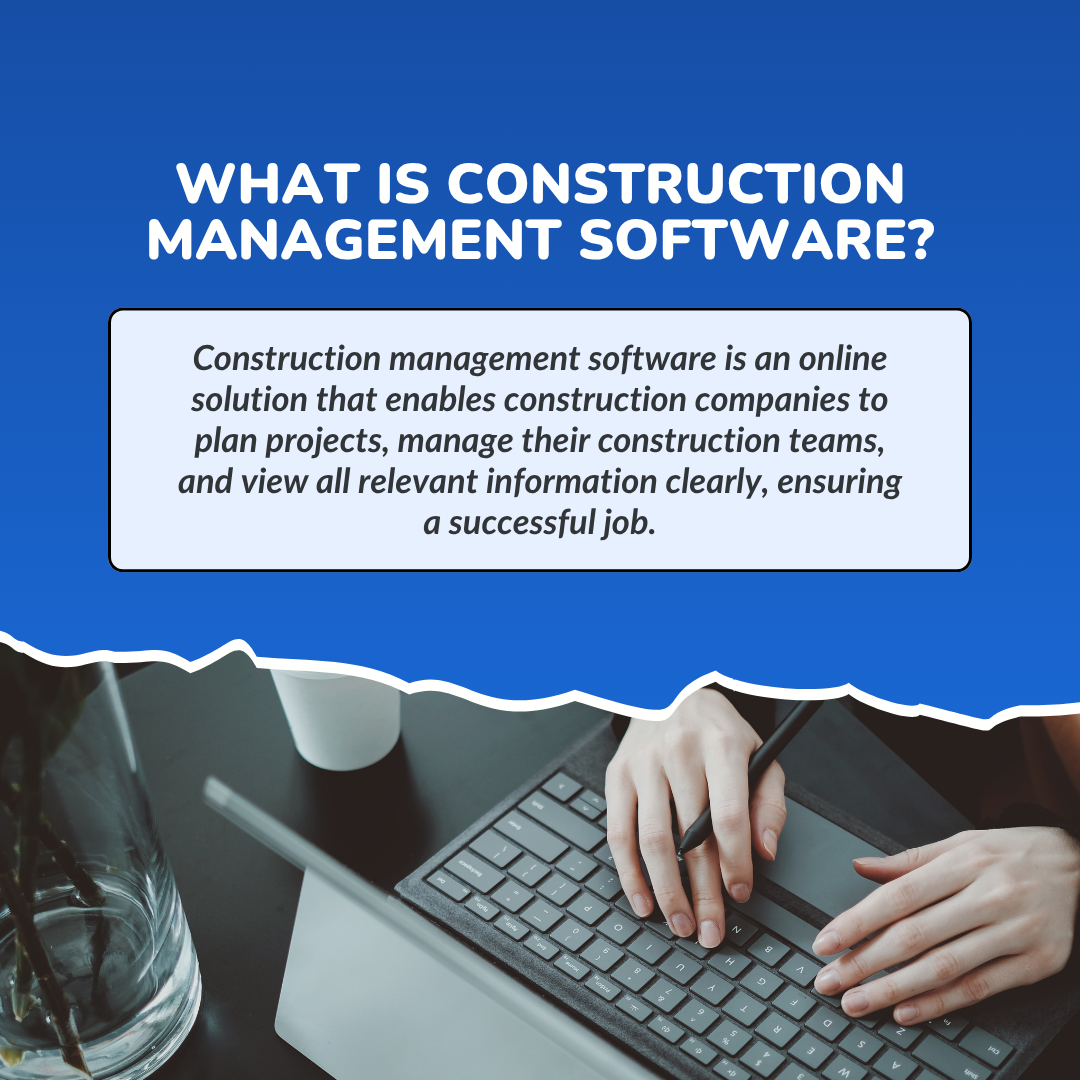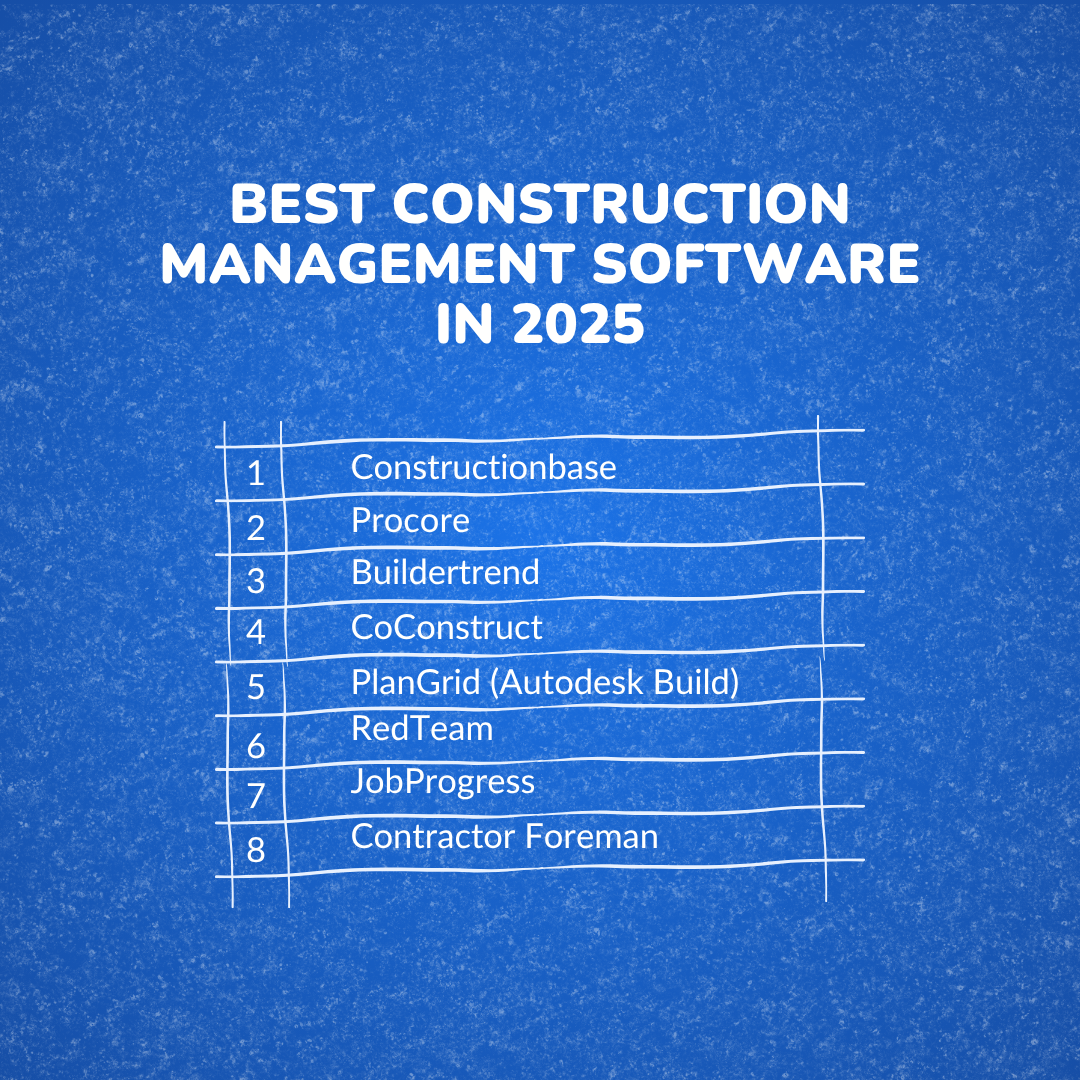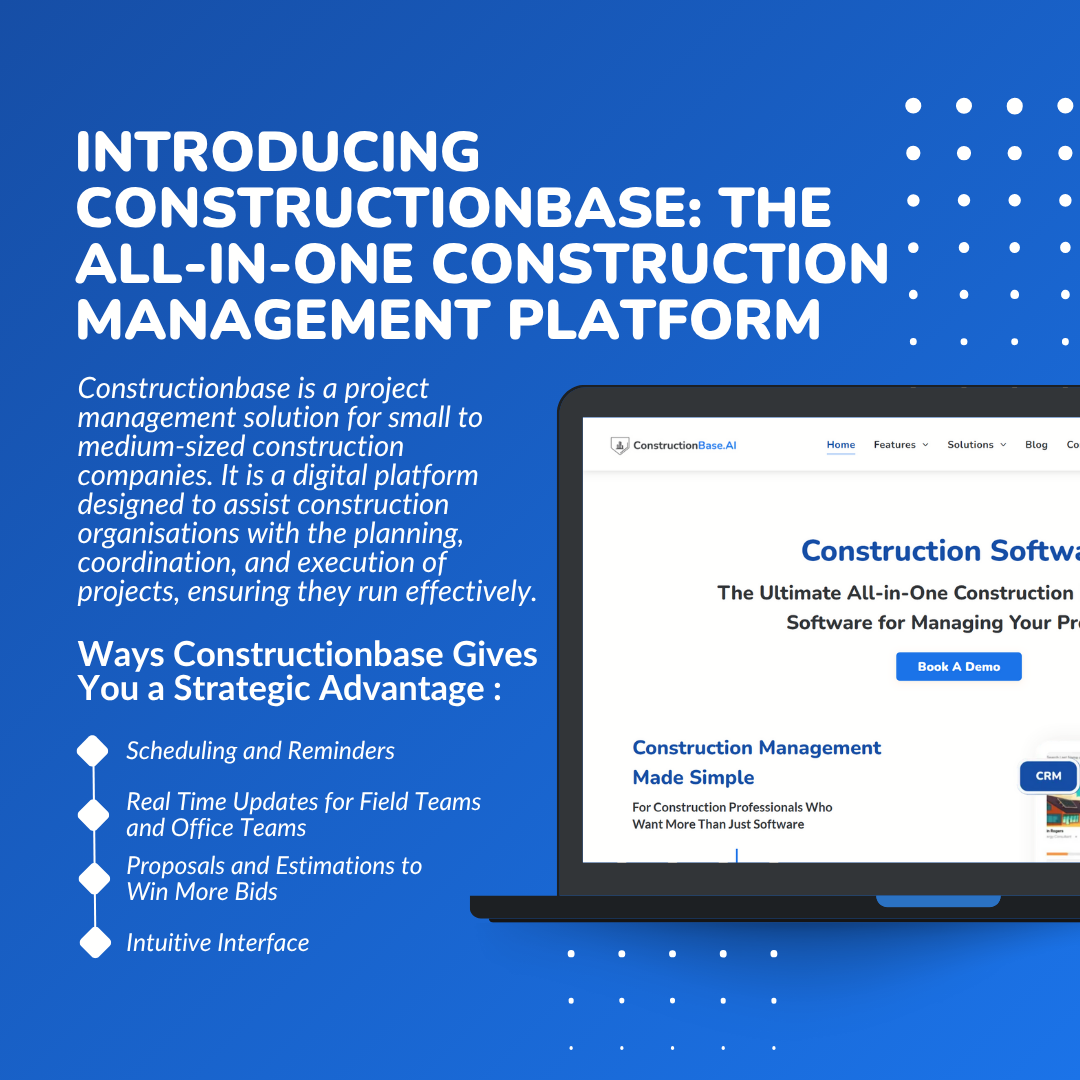Audio overview: Listen & Learn
Construction companies often manage multiple projects simultaneously. Each has its own team, subcontractors, materials, and client demands.
Construction managers strive to update project schedules, reconcile field notes, verify the entire project timeline, and await approvals. This results in delays accumulating and communication gaps emerging. Eventually, the budgets also move upward while accountability blurs.
But what if we told you there’s a smarter way? Construction management software streamlines operations, enhances clarity, and keeps every aspect of your project on track
It aligns project schedules, field and document updates, contractor onboarding, and client proposals within a single platform. With the right software, projects
stay on track. Site teams work in sync with office teams, along with operational productivity.
Key takeaways
- Construction management software turns scattered updates into structured workflows that drive profitability.
- Manual tracking obscures risks that software reveals and resolves in real-time.
- Companies that utilize construction management platforms win bids more quickly and complete projects with fewer delays.
- Constructionbase combines scheduling, tracking, proposals, and contractor management into one powerful tool.
- Growth depends on systems that align your teams, subcontractors, and clients without friction.
Best Construction Management Software for 2025
Construction in 2025 demands precision. Managing multiple projects, teams, and subcontractors requires more than spreadsheets and daily calls.
Therefore, this blog outlines the best construction management software options of 2025 for small to mid-sized companies.
It explains what construction management software is, why it drives growth, and how to choose the right platform based on scheduling, project tracking, site coordination, and contractor management needs.
What is Construction Management Software?

Construction management software is an online solution that enables construction companies to plan projects, manage their construction teams, and view all relevant information clearly, ensuring a successful job.
They become part of the software, which includes scheduling, coordination, and contractor workflows, and generally ensures that the job is done without projects getting delayed.
In the following years, the global construction management software market is projected to reach $11.69 billion and grow to $16.5 billion by 2034, representing a CAGR of 9.0% from 2025 to 2034. This represents a decent estimate.
Why does it matter?
- Scheduling: Assign work to the right people, manage your timing, and allocate your resources based on the requirements of your project
- Project Tracking: View progress at all active process sites in real-time. Remove any issues that arise before they become a disruption to the delivery process.
- Site Coordination: Connects with and responds to field teams, as well as handles administrative duties in the office. Keeping operations in sync and on task regarding items, materials, and approvals.
- Proposal & Estimation: Generate estimates quickly and accurately, and create proposals that look professional, which will increase your closing ratio and keep your pipeline full.
Check this: Construction Trends in Canada: What to Expect
Why Your Construction Project Management Needs Software in 2025?
I. Rising Project Complexity
Construction projects feature more advanced designs, integrated technologies, and specialized subcontractors.
This makes it significant for owners and project managers to work on demands and deadlines with precision and care. But without proper systems, crucial customer details often slip through, leading to rework and disputes that ultimately result in lost money and time.
II. Manual Tracking Creates Hidden Risks
Manual spreadsheets and fragmented updates expose businesses to operational gaps. So, when field teams record notes on paper or WhatsApp, office teams update master trackers days later, leading to data gaps multiplying. Tasks go unassigned and approvals remain pending.
These risks remain invisible until they impact schedules, budgets, or client trust. Companies relying on manual processes absorb hidden costs on every building project.
III. Distributed Teams Demand Seamless Coordination
Construction teams operate across multiple sites. Site supervisors manage crews on the ground, project managers coordinate from offices, and estimators prepare bids for upcoming work.
So, without a centralised system, information remains scattered. Field teams wait for decisions, and office teams lack real-time updates.
Best Construction Management Software in 2025

Here’s a high-level roundup of the top software for small to mid-sized construction companies:
1. Constructionbase
Constructionbase is a centralized platform designed for small to mid-sized construction companies.
It features construction management handling, along with project scheduling, real-time tracking, site coordination, proposals, estimations, and subcontractor management, all within a single interface.
Key Features:
- Project scheduling with AI-based resource optimisation
- Real-time tracking for immediate visibility across sites
- Site coordination tools collaborate with field and office teams
- Proposals and estimations to secure bids efficiently
- Subcontractor onboarding, compliance, and payment management
Best For
Growing construction companies seek an integrated, easy-to-use platform that aligns teams, projects, and contractors with precision.
2. Procore
Procore is a platform used for project management, project tracking, financial management, and field work. It centralises workflows to keep projects on schedule and budgets under control.
Key Features:
- Scheduling and handling tasks, drawings, and daily logs.
- Subcontractor management and compliance tracking.
Best For:
General contractors manage multi-stakeholder projects.
3. Buildertrend
Buildertrend is a cloud-based solution for builders and remodelers. It combines scheduling, proposals, and client communication into one platform.
Key Features:
- Scheduling with timeline management.
- Proposal generation and digital approvals.
- Client portals for streamlined communication.
- Payment processing and financial tracking.
- Mobile app for field updates.
Best For:
Residential contractors and remodelers focused on client experience and operational efficiency.
4. CoConstruct
CoConstruct is helpful for custom home builders and remodelers. It features tools such as estimating, proposal generation, selection, and client communication to simplify project management.
Key Features
- Accurate estimating and cost tracking
- Professional proposals with branded templates
- Scheduling tools to maintain deadlines
- Selection management and client portals
Best For
Small custom home builders manage detailed design selections and client approvals.
5. PlanGrid (Autodesk Build)
PlanGrid, part of Autodesk Build, specialises in construction drawings and document management. It enhances visibility for design teams and field crews.
Key Features
- Centralised drawings and document updates
- RFIs and submittal management
- Issue tracking and resolution workflows
Best For
Companies operating within the Autodesk ecosystem need streamlined drawing management and real-time field access.
6. RedTeam
RedTeam delivers complete project management with integrated financials. It supports end-to-end workflows from budgeting to scheduling and contract management.
Key Features
- Budgeting and financial controls
- Contract and change order management
- Scheduling and resource allocation
- Mobile app for site updates
Best For
Small to mid-sized general contractors require project management and financial management tools to manage their projects effectively.
7. JobProgress
JobProgress combines CRM functionality with project management, offering an operational dashboard for contractors and specialty trades.
Key Features
- Estimates and proposal creation
- Workflow and task management
- Payment tracking and invoicing
- Client relationship management tools
Best For
Specialty contractors and smaller firms are seeking a platform that combines sales pipelines with project delivery workflows.
8. Contractor Foreman
Contractor Foreman is an affordable, all-in-one software solution built for small contractors. It covers essential project management and safety functions.
Key Features
- Scheduling with task assignments
- Estimates and proposal generation
- Capture daily logs for site reporting
- Safety management tools and documentation
- Timesheet tracking for crews
Best For
Small contractors require budget-friendly software to manage projects, teams, and compliance with ease.
Read: Managing Cash Flow in Construction Projects
How to Choose the Best Software for Your Construction Project Team?

Selecting the right construction management software requires a clear understanding of your operational challenges and growth strategy. This process converts market options into actionable decisions. So, look for the following things:
1. Identify Core Operational Challenges
Begin by conducting a thorough assessment of your current project management gaps. Analyse issues such as:
- Delayed RFIs are slowing field execution
- Inconsistent scheduling is impacting resource allocation
- Disconnected updates between the office and site teams
- Errors in proposals and estimations reduce bid success
- Subcontractor compliance tracking delays
Mapping these challenges provides clarity on which software features will deliver the highest immediate impact.
2. Connection to Pain Points
Evaluate software options based on the ability to resolve your prioritised challenges. For example:
- Teams experiencing scheduling conflicts benefit from platforms with advanced scheduling and resource allocation tools.
- Companies struggling with delayed field updates should prioritise real-time site coordination and mobile reporting features.
- If proposal turnaround times limit bid volume, focus on software with built-in proposal and estimation capabilities.
3. Align with Team Size and Project Types
Consider the structure of your company. Assess:
- The number of active projects you manage simultaneously
- The complexity of each project
- Team workflows and subcontractor involvement
Select software designed to support your operational scale without unnecessary complexity or underpowered features.
4. Focus on Integration and Support
Look for software that will integrate easily with your existing tools, for example:
- Accounting, design, and procurement platforms.
- Quality support is also essential to ensure your systems are properly onboarded, any bugs are dealt with quickly, and your team can be optimized as they try new workflows.
5. Test with Free Demos or Trials
Before you make a full commitment, book demos or try a free trial. Look at how easy it is to:
- You and your teams can navigate easily in the field and the office
- How quickly and accurately is syncing done
- The intuitiveness of the user interface
- Training, training resources, and quick support options were available
Demos and trials are often the best way to determine whether the software will meet the basic elements for everyday execution needs and the long-term aspirational goals of your team.
Introducing Constructionbase: The All-in-One Construction Management Platform

Constructionbase is a project management solution for small to medium-sized construction companies. It is a digital platform designed to assist construction organisations with the planning, coordination, and execution of projects, ensuring they run effectively.
It combines project tracking, site coordination, proposals, and contractor management in one AI-supported platform, enabling teams to have a unified view of their operations and eliminating the need to manage numerous individual tools and services.
Ways Constructionbase Gives You a Strategic Advantage :
A. Scheduling and Reminders
Provides optimized scheduling and reminders to keep projects moving smoothly.
B. Real-Time Updates for Field Teams and Office Teams
Keeps field crews and office decision-makers aligned by streamlining updates from field teams to all other teams in real-time.
C. Proposals and Estimations to Win More Bids
Allows teams to create accurate estimates and professional proposals, thereby expediting their bid submissions and conversions.
D. Intuitive Interface
Allows teams to deploy quickly using an interface designed for ease of use in both the field and the office.
Final Thoughts: The Path to Construction Project Clarity and Profitability
Construction management software is a strategic investment, as it facilitates informed decision-making and streamlines the workflow. It is a strategic asset that drives operational efficiency, reduces execution errors, and protects profitability.
The choice lies in whether to maintain legacy processes or implement systems built for growth. Each software option outlined here strengthens scheduling, project tracking, site coordination, and contractor management.
These operational levers drive scale and foster an excellent reputation for your business.
Take the Next Step Towards Success with Constructionbase
Managing projects, teams, and subcontractors requires precision and attention to detail.
What You Gain with Constructionbase:
- Real-time project tracking and document management for clear operational visibility
- Seamless coordination between office and field teams
- Fast, accurate proposals and estimates to secure more bids
- Streamlined subcontractor management within one platform
Explore how Constructionbase transforms project delivery and drives profitability.
Start today. Book your demo and see Constructionbase in action!
FAQs
Q.1. Which is the best construction management software?
The best construction management software will depend on your company's size, the complexity of the project, and your operational needs.
For small to mid-sized construction companies, Constructionbase offers an all-in-one AI-powered platform featuring scheduling, project tracking, site coordination, proposal management, and subcontractor management.
Q.2.What is the project construction management software?
It helps in scheduling, task assignment, real-time tracking, document management, subcontractor onboarding, and proposal management in one digital space, enabling valuable workflow efficiencies and reducing delays.
Q.3.What is the most used Project Management software?
Various industries and teams will have their preferred project management software, based on the project type and its specific requirements.
Have questions or need personalized advice?
Talk to an Expert Today and let our construction specialists guide you to success.







